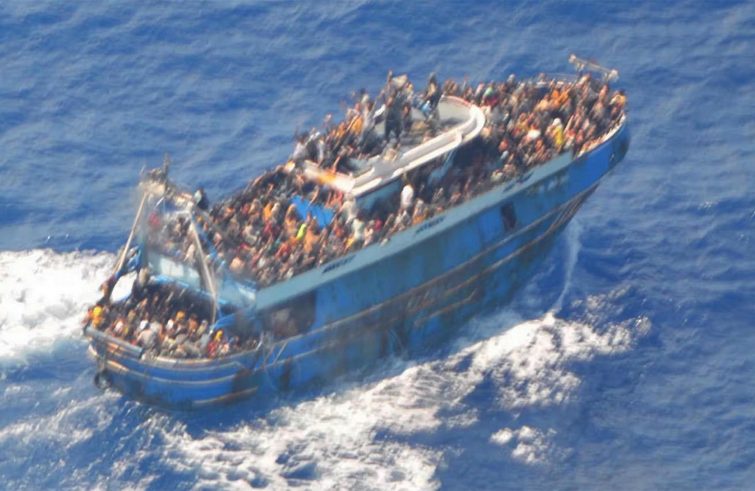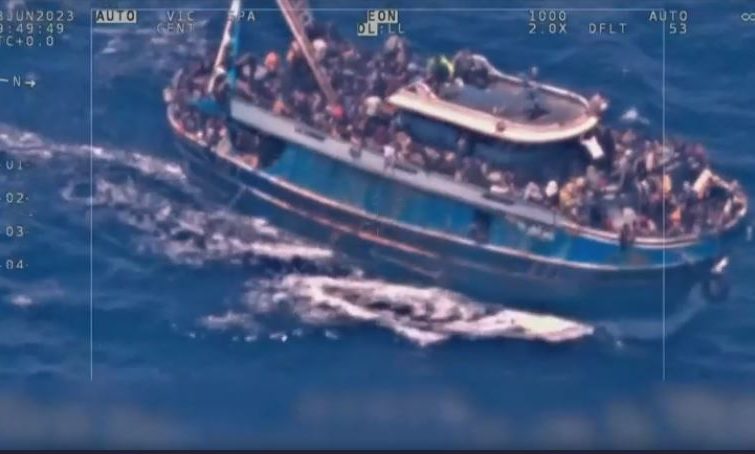
“How could this have happened?” This is the big, haunting question resonating these days among Greek humanitarian aid workers after last week’s shipwreck of a fishing boat with more than 750 people on board off Greek shores: 104 survivors taken in by the city of Kalamata, 82 bodies recovered so far and at least 600 missing (including some 100 children and 300 Pakistani nationals). Maria Alverti, Director of Caritas Hellas (Caritas Greece), asks the same question, while controversial reconstructions of the incident are starting to surface: “I believe it is the single most serious shipwreck in the Mediterranean Sea”, she told SIR. “The most disturbing aspect is not just the number of people who died all together, but the fact that they could have been saved.”
Controversies surrounding the incident. Survivors and footage from various national and international media outlets suggest that the overcrowded fishing vessel was not moving for at least seven hours. When it capsized, the Greek coastguard allegedly left and returned ten minutes later with small boats to rescue those who tried to swim to safety. The Greek coastguard denied the allegations, claiming that those on board refused assistance because they wanted to go to Italy. Meanwhile, more people are dying in the Mediterranean. Last night a fishing boat carrying 44 migrants, including six women (one pregnant), capsized off the coast of Lampedusa. They were rescued by the Italian coastguard. According to survivors, there were three other people on board who are currently missing. According to Alarm Phone, 24 people were rescued by the Moroccan navy from a boat carrying 59 migrants that was drifting off the Moroccan coast, with 3 dead on board and water in the hull. At least 35 people remain missing. The boat had set off from Agadir, a coastal city in Morocco, heading for Spain. The small Caritas Hellas centre, which is actively involved in a refugee centre in the city of Mytilene on the island of Lesbos, has no Caritas offices or volunteers in Kalamata and southern Greece. The survivors of the shipwreck were assisted by the local civil protection authorities and transferred to government refugee centres.
 Where does Caritas Greece stand with regard to the shipwreck?
Where does Caritas Greece stand with regard to the shipwreck?
The election campaign is in full swing (general elections will be held this coming Sunday, Ed.’s note.), and a heated internal debate is taking place between the government and opposition parties, and we don’t want to identify ourselves with either one. Ours is just a humanitarian perspective. However, the shipwreck poses many questions. We are very saddened and shocked and wonder
how it could have happened when there were so many ships all around and during daylight. Shipwrecks mostly occurred when there were no vessels nearby and in the middle of the night.
No one knows. The biggest question is: how was it possible? The coastguard said the vessel refused Greek help saying it wanted to go to Italy. But when people’s lives are in danger, it doesn’t matter what they say! Someone should have taken action. Would we have not helped those on the vessel had it been crowded with tourists or students and lost at sea just because they said they didn’t need help? Footage released by the the BBC shows that the fishing vessel was not moving for at least seven hours before it capsized. We also wonder: if those persons had survived, which European countries would have taken them in? That happens all the time. Despite expressions of grief and proclamations of national mourning, the sad truth is that no country wants them.
Is this the single deadliest shipwreck in the history of Greece?
I think the shipwreck off the coast of Greece is the most serious tragedy in the Mediterranean Sea. The most disturbing aspect is not just the number of people who died all together, but the fact that they could have been saved.
We are also feeling confused over the nine alleged traffickers arrested, who claim they are innocent. The question is: had they been guilty, would they have also boarded the fishing vessel, putting their lives at risk?
These past few days media outlets put the spotlight on the search and rescue operations prompted by the submersible ‘Titan’ that vanished with five billionaires aboard in the North Atlantic Ocean two days ago. Five ships are now at the scene of the Titanic shipwreck, four more are on their way. In contrast, very little attention was given to the shipwreck in Greece and controversy broke out on social media about the indifference caused by the deaths in the Mediterranean compared to others. What is your opinion?
Another example is the war in Ukraine. There is no reason to treat Middle Eastern or African refugees any differently from those in Europe. The situation of the Ukrainian refugees has shown us that it is possible to welcome refugees, it has set a great precedent, a good practice to be followed. It depends a lot on whether the people in need are citizens of the government that is supposed to rescue them. I don’t know if it depends on the US$250000 ticket paid by billionaires as opposed to the €5/6000 for the journey of hope, but there is only one question: why?
We ask ourselves: what if the shipwrecked fishing boat had been full of European tourist fishermen? Would we have left them to their fate without offering any help? Or would we have offered a half-hearted rescue?
Is the umpteenth appeal to Europe even possible? It seems that, with a view to externalising the EU’s borders, the only option is to reach agreements with the countries of transit and departure.
This has always been the case. There is a clear directive to leave people at the borders, but this is a Greek, Italian, Spanish problem, not an EU problem. No one thinks that those fleeing their country are putting their lives at risk just because they are already in danger and cannot enter through legal channels. We too are very much part of Europe, but it seems that no EU member state is taking a different approach: It’s as if we were invoking something alien to us.
There is much talk of humanity, solidarity, respect, democracy, but it appears that those values are valid only for us, not for others.











